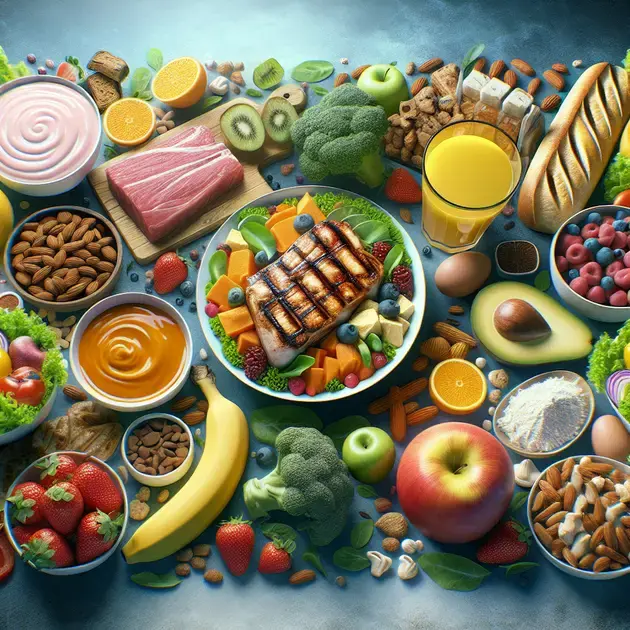When it comes to achieving effective weight loss, one crucial factor to consider is optimizing calorie intake. By carefully managing the number of calories consumed each day, individuals can create a sustainable plan that promotes healthy and gradual weight loss.
Recent studies have shown that the key to successful weight loss lies in striking the right balance between calorie intake and energy expenditure. Understanding how to optimize calorie intake can lead to long-term results and help individuals reach their weight loss goals efficiently.
Optimizing Calorie Intake for Weight Loss Success
When it comes to achieving weight loss success, optimizing your calorie intake is crucial. Whether your goal is to shed a few pounds or embark on a significant weight loss journey, understanding how to manage your caloric intake effectively can make a significant difference. One way to do this is by using a calorie tracking app like MyFitnessPal. This popular app allows you to set personalized goals, track your food intake, and monitor your calorie consumption.
In addition to using a calorie tracking app, it’s essential to focus on the quality of the calories you consume, not just the quantity. Opt for nutrient-dense foods that are rich in vitamins, minerals, and fiber to support your overall health and well-being. Websites like EatThisMuch can help you plan your meals based on your calorie goals and nutritional preferences, making it easier to optimize your calorie intake for weight loss success.
Another crucial aspect of optimizing calorie intake for weight loss is understanding portion control. Apps like Lose It! provide tools and resources to help you measure and track portion sizes accurately. By being mindful of portion sizes and listening to your body’s hunger cues, you can better manage your calorie intake and support your weight loss goals effectively.
It’s also essential to stay consistent with your calorie optimization efforts. Create a sustainable meal plan that aligns with your calorie goals and preferences. Websites like SparkPeople offer meal planning features and recipes tailored to your dietary needs, making it easier to stick to a calorie-conscious eating plan for long-term success.
Lastly, consider seeking guidance from a nutritionist or dietitian to create a personalized calorie optimization plan. These professionals can offer tailored advice and support to help you make informed decisions about your calorie intake and achieve sustainable weight loss results.
Creating a Sustainable Plan for Effective Weight Management
Effective weight management requires more than just short-term solutions. To create a sustainable plan for long-term success, start by setting realistic and achievable goals. Websites like Precision Nutrition offer goal-setting tools and resources to help you establish a clear roadmap for your weight management journey.
Another essential aspect of creating a sustainable weight management plan is incorporating regular exercise into your routine. Apps like Strava can help you track your workouts, set fitness goals, and stay motivated to stay active. By combining a balanced diet with regular physical activity, you can improve your overall health and well-being while effectively managing your weight.
Meal prepping is a valuable strategy for maintaining a sustainable weight management plan. Websites like Prepear provide meal planning and prepping tools to help you organize your meals in advance and avoid impulsive food choices. By preparing healthy meals ahead of time, you can make it easier to stick to your calorie and nutrition goals.
Consistency is key when it comes to effective weight management. Establishing healthy habits and routines, such as mindful eating practices and regular exercise, is essential for long-term success. Apps like Habitica can help you build and track healthy habits to support your weight management goals and ensure lasting results.
Remember that weight management is a journey that requires dedication and commitment. By creating a sustainable plan that prioritizes your health and well-being, you can achieve long-term success in managing your weight and leading a healthier lifestyle.
Crafting a Balanced Meal Strategy for Sustainable Weight Control
A balanced meal strategy is essential for sustainable weight control. By including a variety of nutrients in your meals, you can support your body’s needs while managing your weight effectively. To craft a balanced meal strategy, start by focusing on incorporating lean proteins, whole grains, fruits, vegetables, and healthy fats into your daily meals.
Proteins such as chicken, fish, tofu, and legumes can help keep you full and satisfied, reducing the likelihood of overeating. Whole grains like quinoa, brown rice, and whole wheat bread provide fiber and energy for your body. Fruits and vegetables offer essential vitamins, minerals, and antioxidants that support overall health.
In addition, don’t forget about healthy fats like avocados, nuts, and olive oil. These fats are important for brain function and hormone production, and can help you feel satiated after a meal. By balancing these nutrients in each meal, you can create a sustainable eating plan that promotes weight control.
Remember to also pay attention to portion sizes and listen to your body’s hunger cues. Eating mindfully and savoring each bite can help prevent overeating and promote a healthy relationship with food. With a thoughtful and balanced meal strategy, you can achieve sustainable weight control in the long term.
Implementing Smart Habits to Support Your Weight Loss Journey
Implementing smart habits is crucial for supporting your weight loss journey. To start, focus on setting realistic and achievable goals for yourself. Whether it’s incorporating more physical activity into your day or reducing your intake of sugary drinks, small changes can lead to big results over time.
Another smart habit to adopt is meal planning and preparation. By planning your meals ahead of time and having healthy options readily available, you can avoid the temptation of fast food or unhealthy snacks. Additionally, making time for regular exercise, getting enough sleep, and managing stress are all important factors in supporting weight loss.
Tracking your progress can also be a helpful smart habit. Whether you use a journal, an app, or a fitness tracker, monitoring your food intake, exercise, and weight loss can help keep you accountable and motivated. Celebrate your successes along the way and learn from any setbacks to continue moving forward on your weight loss journey.
Remember, building sustainable habits takes time and perseverance. By incorporating smart habits into your daily routine, you can create a supportive environment for successful weight loss and long-term health.
Maximizing Nutrient Intake for Lasting Weight Management
Maximizing your nutrient intake is key for lasting weight management. To achieve this, focus on eating a variety of nutrient-dense foods that provide essential vitamins, minerals, and antioxidants. Incorporating a rainbow of fruits and vegetables into your meals can help ensure you’re getting a wide range of nutrients to support your overall health and weight goals.
In addition, include lean proteins such as poultry, fish, beans, and nuts in your diet to help build and repair tissues, maintain muscle mass, and keep you feeling full. Whole grains like quinoa, oats, and barley provide fiber and energy to sustain you throughout the day without causing spikes in blood sugar.
Don’t forget about healthy fats like avocado, olive oil, and fatty fish, which are important for heart health and can help you absorb fat-soluble vitamins. Drinking plenty of water and staying hydrated is also vital for overall health and can help prevent overeating due to thirst signals being mistaken for hunger.
By prioritizing nutrient-dense foods and ensuring you’re getting a balance of macros and micros in your diet, you can maximize your nutrient intake for lasting weight management. Remember, it’s not just about the quantity of food you eat, but the quality of the nutrients you consume that can make a significant impact on your weight and overall well-being.
Conclusion
Crafting a balanced meal strategy that includes lean proteins, whole grains, fruits, vegetables, and healthy fats is essential for sustainable weight control. By ensuring a variety of nutrients in your meals, you can support your body’s needs effectively and manage your weight in the long term. Remember to pay attention to portion sizes, listen to your body’s hunger cues, and eat mindfully to prevent overeating and maintain a healthy relationship with food.
Implementing smart habits such as setting realistic goals, meal planning, regular exercise, sufficient sleep, and stress management is crucial for supporting your weight loss journey. Monitoring your progress and learning from setbacks can keep you motivated and accountable. Building sustainable habits over time creates a supportive environment for successful weight loss and long-term health.
Maximizing your nutrient intake through nutrient-dense foods like fruits, vegetables, lean proteins, whole grains, and healthy fats is vital for lasting weight management. Balancing macros and micros in your diet, staying hydrated, and focusing on the quality of nutrients consumed can significantly impact your weight and overall well-being. Prioritizing nutrient-rich foods will support your weight goals and help you achieve a healthier lifestyle.

